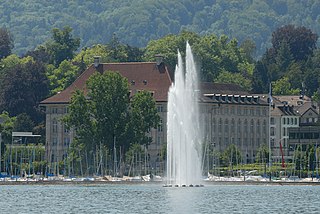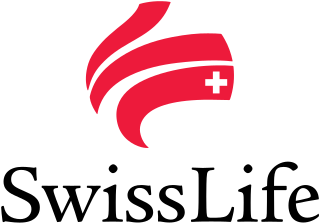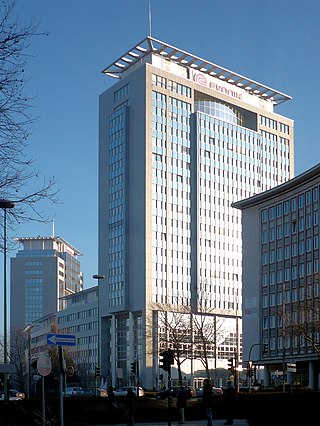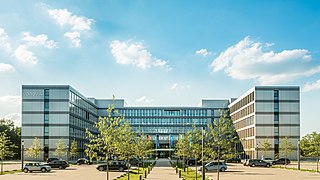
Swiss Reinsurance Company Ltd, commonly known as Swiss Re, is a reinsurance company based in Zurich, Switzerland. It is one of the world's largest reinsurers, as measured by net premiums written. Swiss Re operates through offices in more than 25 countries and was ranked 118th in Forbes Global 2000 leading companies list in 2016. It was also ranked 313th on the Fortune Global 500 in 2015.

In accounting, insolvency is the state of being unable to pay the debts, by a person or company (debtor), at maturity; those in a state of insolvency are said to be insolvent. There are two forms: cash-flow insolvency and balance-sheet insolvency.

Karstadt Warenhaus GmbH was a German department store chain whose headquarters were in Essen. Until 30 September 2010 the company was a subsidiary of Arcandor AG and was responsible within the group for the business segment of over-the-counter retail.

Vicinity Centres ASX: VCX, previously known as Federation Centres and Centro Properties Group, is an Australian Real Estate Investment Trust specialising in ownership and management of Australian shopping centres. As at December 2021, it had stakes in 60 shopping centres. It is headquartered at Chadstone Shopping Centre in Melbourne.

The Swiss Life Group is the largest life insurance company of Switzerland and one of Europe’s leading comprehensive life and pensions and financial services providers, with approximately CHF 276.3 bn of assets under management. Founded in 1857 in Zurich as the Schweizerische Lebensversicherungs und Rentenanstalt cooperative, the company entered the Swiss stock market in 1997 and adopted its current name in 2002. In 2021 the group declared an adjusted profit from operations of CHF 1.81 billion, a 15% decrease compared to the previous year. Net profit increased by 20% to CHF 1.3 billion. Swiss Life is one of the twenty companies listed under the Swiss Market Index, as SLHN.

Evonik Industries AG is a stock-listed German specialty chemicals company headquartered in Essen, North Rhine-Westphalia, Germany. It is the second largest chemicals company in Germany, and one of the largest specialty chemicals companies in the world. It is predominantly owned by the RAG Foundation and was founded on 12 September 2007 as a result of restructuring of the mining and technology group RAG.

Orco Property Group S.A. is a real estate development company founded by Jean-François Ott based in Luxembourg, listed on the Euronext in Paris, Prague, Warsaw and Budapest Stock Exchange, it is a subsidiary of CPI Property Group.

Hamburg Commercial Bank is a commercial bank in northern Europe with headquarters in Hamburg as well as Kiel, Germany. It is active in corporate and private banking. Considered to be the world’s largest provider of maritime finance, its main focus is on shipping, transportation, real estate and renewable energy. The bank is one of the pioneers in the pan-European project financing of renewable energies and is also involved in the expansion of digital infrastructure. In 2022, the bank won the “World’s Best Bank Transformation” award by Euromoney trade magazine.

Union Investment is the investment arm of the DZ Bank Group and part of the cooperative financial services network. It was founded in 1956 and is headquartered in Frankfurt.

Engel & Völkers AG is a privately owned German company that, via a series of franchised offices, provides services related to real estate transactions.
Signa Holding GmbH is Austria’s largest privately owned real estate company. Signa was founded in 2000 by the Tyrolean entrepreneur René Benko. Over the years, it has become a pan-European real estate group with more than 150 employees and offices in Vienna, Innsbruck, Munich, Düsseldorf, Luxembourg, Zurich, Bolzano, Berlin and Hamburg. The principal focus of the group is long-term investment in real estate in prime city centre locations. The firm has also became the biggest owner of malls in Mid Europe with over 46.000 employees.

The Dr. Peters Group, registered in Dortmund, is an investment firm that has been placing and managing tangible assets since 1975 in the legal form of a limited partnership. The investment targets are mobile and immobile goods of the real economy such as ships, real estate and aircraft; Dr. Peters is no longer active on the secondary market for life insurances. The funds are offered to investors in Germany and Austria via banks and free agents. Since 2013, the Dr. Peters Group has been designing funds for national and international institutional investors. The group is a member of the Bundesverband Sachwerte und Investmentvermögen e.V.

Patrizia SE has been active as an investment manager in the real estate market across Europe for more than 38 years. Based in Augsburg, Germany, the company is listed on the Frankfurt stock exchange and, among others, is a member of the SDAX and MSCI World Small Cap Index.
Immofinanz is a commercial real-estate company that focuses its activities on the retail and office segments of seven core markets in Europe: Austria, Germany, Czech Republic, Serbia, Slovakia, Hungary, Romania and Poland. The core business includes the management and development of properties. The company has a real estate portfolio of EUR 5.0 billion that covers approx. 210 properties, as of 31 December 2020.

Vonovia is a German real estate company based in Bochum, North Rhine-Westphalia. Its history goes back to Deutsche Annington, which merged with GAGFAH and was subsequently renamed Vonovia. The company currently owns around 400,000 apartments in Germany, Sweden, and Austria, making it a significant market player in these countries. Vonovia is a member of the DAX 40 and STOXX Europe 600 blue-chip indexes.
Yakir Gabay is a Cypriot-Israeli billionaire real estate businessman, based in London. He owns 10% of Frankfurt-listed Luxembourgish real estate company Aroundtown SA.
Aroundtown SA is a publicly listed real estate company, registered in Luxembourg. It invests in commercial and residential properties in central locations in European cities primarily in Germany and the Netherlands.
Amir Dayan is an Israeli businessman and investor specializing in commercial real estate. He has been active in the European real estate and hotels business since 2005, primarily in Germany, UK and Netherlands. Dayan is a shareholder in several real estate private and public stocks and funds.

S IMMO AG is a real estate investment company that invests in properties in Austria, Germany and Central and Eastern Europe. As of the end of 2021, its property assets totalled just under EUR 2.8 billion.
Bergfürst AG is a German equity crowdfunding firm, financial services provider and former bank headquartered in Berlin, Germany.















